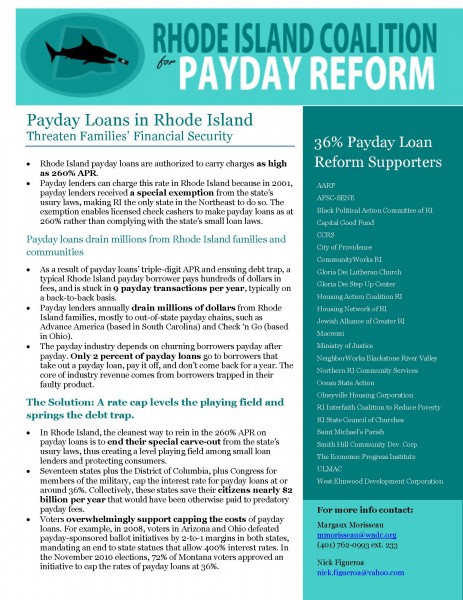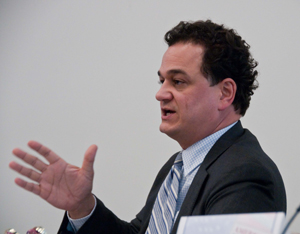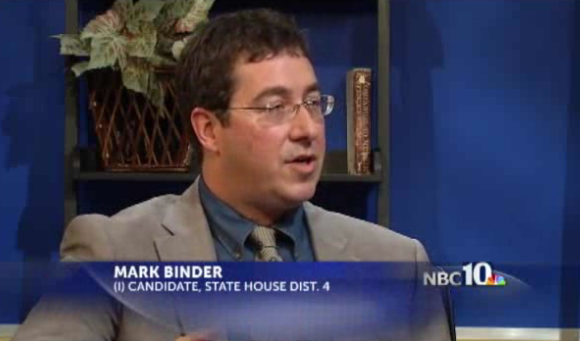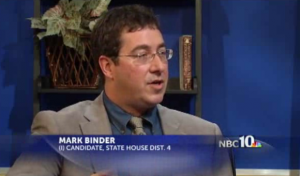
Correction: After this piece was published I received the following communication from Carolyn Cronin, Director of Communications for the Diocese of Providence:
“The article you are referencing in your piece was an editorial in the RI Catholic newspaper. Bishop Tobin is the publisher, but he does not write or review the editorials. It is a separate opinion of the paper. So to attribute those quotes to him are not accurate. I would appreciate the clarification.”
When I asked Cronin what Bishop Tobin’s views on payday lending are, I received this reply:
“The Bishop supports the traditional teaching of the Church, but has not made any specific statements about pending legislation. Father Healey represents the diocese on this and other issues at the Statehouse.”
The piece below has been modified to reflect the fact that the statements made in Rhode Island Catholic should not be attributed to Bishop Tobin.
I regret the error.
The Rhode Island Catholic newspaper came out against payday loans in an editorial.
After referring to such loans as “heresy” Rhode Island Catholic said, “Usury, the charging of extreme interest, is condemned by Catholic doctrine. Recently Pope Benedict XVI explicitly condemned usury in his encyclical letter Caritas in Veritate. St. John Paul II called usury ‘a scourge that is also a reality in our time and that has a stranglehold on many people’s lives.’”
“Rhode Islanders,” continued Rhode Island Catholic, “especially R.I. Catholics, should stand up against payday lending, the usury of our time. The extremely poor need protections from what appears their only option in a challenging economy. Extreme rates of interests, with little chance of payment in a timely fashion, are not the way to grow a healthy economy. Instead, the poor need regulations against financial charlatans who seek the economic ruin of those on the margins.”
That usurious lending is ideologically opposed in Catholic theology should come as no surprise to Speaker of the House Nicholas Mattiello, a lifelong Catholic, who continues to oppose reform.
“The case has not been made to me to terminate an industry in our state,” said Mattiello last month, “The arguments against payday lending tend to be ideological in nature.”
This would not be the first time that Mattiello has found himself politically at odds with his putative faith. A Providence Journal report, published shortly after his accession to speaker, says, “A Roman Catholic who for half his life had been a lector at Immaculate Conception Church, in Cranston, Mattiello opposed gay marriage. His view changed, he says, as society became more accepting and the issue became one of equality. Today, Mattiello says his vote to legalize gay marriage is one ‘that I am proud of,’ even though it cost him his lector position.”
Mattiello’s recent statement on payday loans is no different than the view he expressed back in March 2014, when he said, “Payday lending is a hot button issue, but the consumer likes the product. It’s an ideological approach. I will make my decisions based on evidence and how it actually impacts people and our economy. I’ve asked for evidence on that issue in the past in my position as House majority leader and I’ve been promised a dozen times over, and I’ve never gotten evidence on that.”
What evidence Mattiello is looking for is hard to imagine, given that year after year the House Finance Committee hears testimony from the AARP, the Economic Progress Institute, Rhode Island Coalition for the Homeless, Rhode Island AFL-CIO and the Rhode Island Payday Lending Coalition. These groups present reams of evidence detailing the harmful effects of payday loans to both individuals the state’s economy.
To some, Mattiello’s willful ignorance about the plain evils of payday loans seems predicated on the special relationship he has with the payday loan industry’s paid lobbyist. According to RI Monthly, former Speaker of the House William Murphy, who is the paid lobbyist for the payday loan company Advance America Cash Advance Centers, is “like a brother” to Mattiello. “In 1994, Mattiello ushered at Murphy’s wedding.” In 2006 Murphy encouraged Mattiello to go into politics, starting him on his path to speaker of the house.
One of Speaker Mattiello’s favorite words is “outlier” in that he claims he doesn’t want Rhode Island to be one. “Rhode Island is one of only 13 states with an income tax on Social Security,” said Mattiello, “and I am tired of our state being an outlier.”
Sam Wroblewski, at WPRO, writes, “Mattiello said not assessing fees to out-of-state trucking operations makes Rhode Island an outlier in the northeast.”
One way that Rhode Island is an outlier that doesn’t seem to bother Mattiello is payday loans.
“Rhode Island payday loans are authorized to carry charges as high as 260% APR,” says the Economic Policy Institute, “Payday lenders can charge this rate in Rhode Island because in 2001, payday lenders received a special exemption from the state’s usury laws, making RI the only state in the Northeast to do so. The exemption enables licensed check cashers to make payday loans as at 260% rather than complying with the state’s small loan laws.”
Apparently, being an outlier is okay if one of your best friends is making $50,000 a year.
It seems clear that the day Nicholas Mattiello will allow a vote on the abolition or restructuring of payday lending laws here in Rhode Island is the day that Advance America decides to stop employing Mattiello’s friend Bill Murphy as a lobbyist. Until that day, the poor will continue to be exploited and money will continue to be sucked out of Rhode Island communities.
Catholic ideology be damned.










